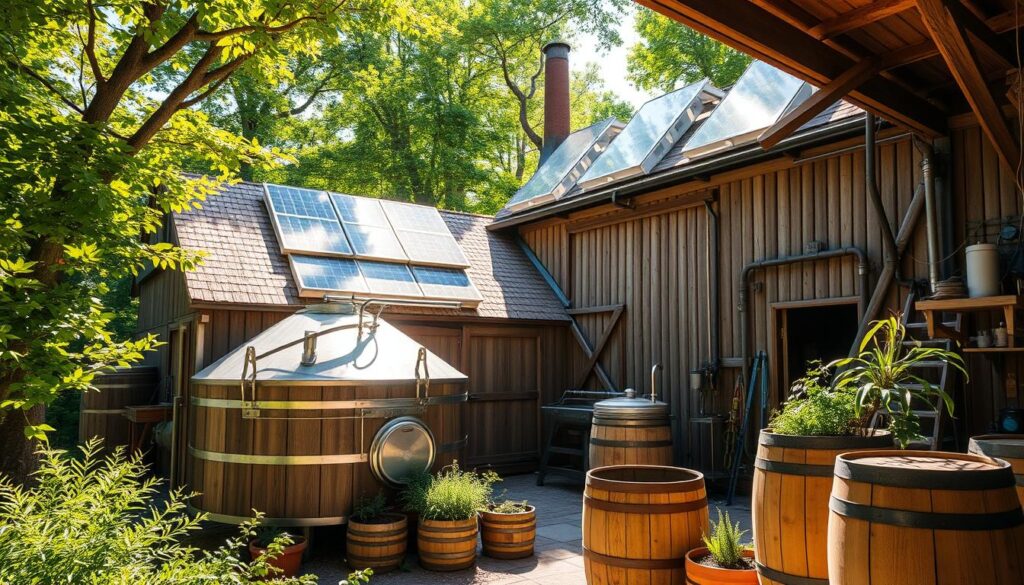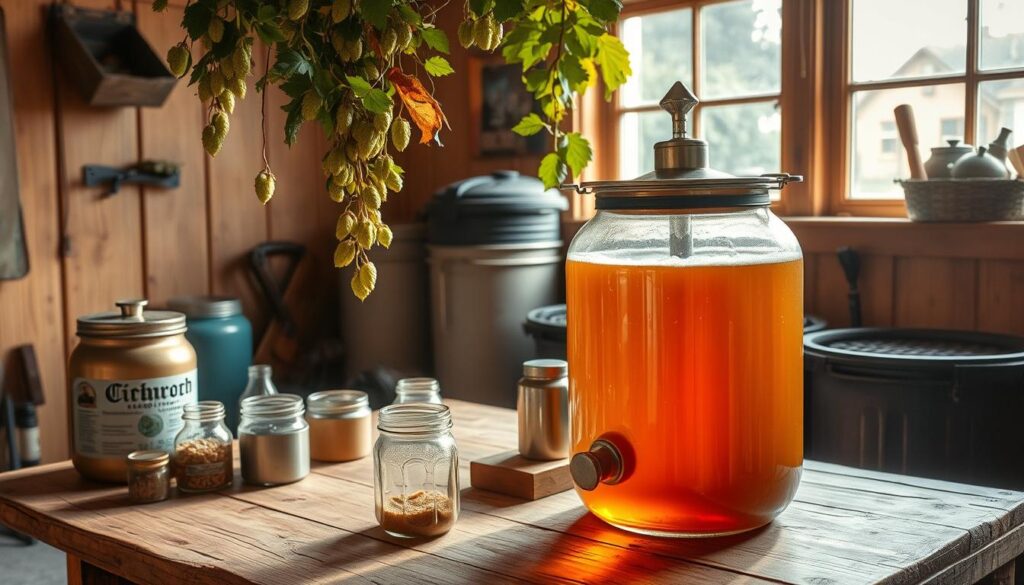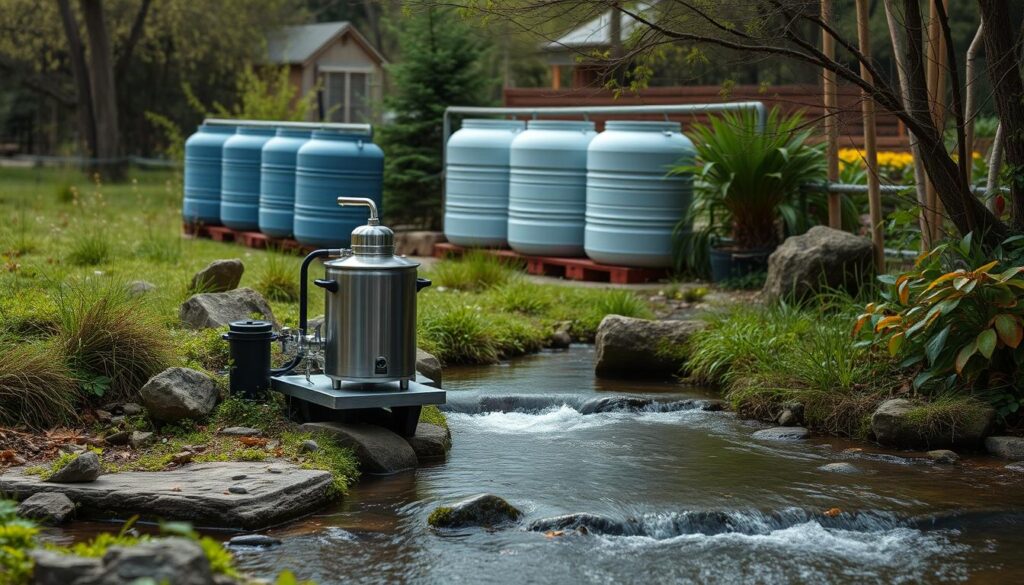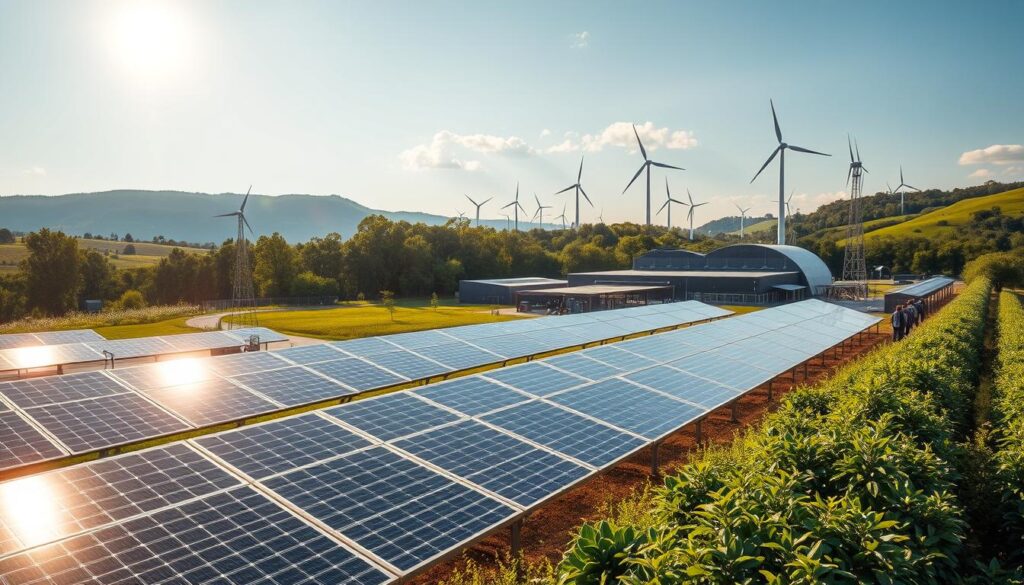North Coast Brewing Company achieved a 99.36% waste diversion rate in 2017. This shows the potential of zero-waste brewing to transform the beer industry. As a homebrewer, I’ve seen how sustainable techniques can reduce environmental impact while making great beer.
Eco-friendly brewing practices are often efficient and cost-effective. They use fewer supplies and materials, benefiting both your wallet and the environment. Proper cleaning, sanitation, and ingredient storage help avoid bad batches.
Before dumping a batch you think is bad, offer it to friends for tasting. If it’s truly unbearable, spread it over your lawn or flowerbed instead of the sewer.
Key Takeaways
- Sustainable brewing practices can significantly reduce a brewery’s carbon footprint while delivering great-tasting beer.
- Sourcing local ingredients and implementing water-saving technologies are key to achieving sustainable brewing goals.
- Repurposing waste products, such as spent grains, can contribute to a greener environment.
- Innovative packaging solutions and green transportation strategies can further minimize the environmental impact of brewing.
- Harnessing renewable energy sources like solar power can help decrease a brewery’s carbon footprint.
What is Sustainable and Eco-Friendly Brewing?
Eco-friendly brewing adopts environmental measures in beer production. It minimizes negative impacts and promotes efficient resource use. This approach preserves ecological balance and reflects smart system design.
Sustainable brewing is gaining popularity in the industry. Breweries aim to reduce their environmental footprint. They’re meeting the growing demand for responsible products.
These practices include various strategies. Water conservation and energy management are key. Waste recycling and byproduct utilization also play important roles.
Key Aspects of Sustainable Brewing
- Water conservation through closed-loop water systems and rainwater harvesting
- Energy efficiency improvements, including the use of renewable energy sources
- Waste reduction and recycling, such as repurposing spent grains and organic waste
- Sustainable raw material sourcing, including locally grown hops and organic ingredients
- Eco-friendly packaging and distribution methods to minimize carbon footprint
- Employee education and engagement to promote a culture of sustainability
Embracing sustainable practices helps breweries reduce their environmental impact. It positions them as responsible industry leaders. This shift is crucial for preserving our ecosystems.
Sustainable brewing ensures a better future for the industry. It benefits communities and the planet as a whole.

“Sustainable brewing is not just about reducing our environmental impact, but about building a better future for our communities and the planet.”
Benefits of Zero-Waste Brewing Practices
Eco-friendly brewing offers many benefits to breweries. It cuts costs, reduces resource use, and improves environmental impact. Sustainable breweries can stand out and meet growing demand for green products.
A new craft brewery opens in Australia every six days. This growth highlights the need for sustainable practices. The beer industry’s impact is huge, using 200 billion aluminum cans yearly.
Plastic beer can rings also threaten marine life. Zero-waste brewing can help solve these issues. Breweries are taking action by assessing waste and mandating compostable packaging.
They’re also educating staff and customers about proper disposal. Sierra Nevada created a recycling co-op for North Carolina brewers. Avery Brewing became a drop-off point for other breweries’ grain bags.
MillerCoors (now Molson Coors) aimed to be landfill-free by 2025. They’re recycling metal, glass, plastic, and paper. They’re also using biodegradable or compostable packaging materials.
Anheuser-Busch started a Zero Waste Box program for PPE disposal. Participating breweries offer gifts for PPE drop-offs. Brooklyn Brewing switched to reusable pallet wraps, saving over 9,100 feet of plastic wrap.
Sustainable practices help breweries reduce environmental impact and cut costs. They also enhance brand reputation. Consumers can support zero-waste breweries and recycle properly. Advocate for eco-friendly initiatives in the brewing industry.

“Implementing zero-waste brewing practices is not only good for the environment, but it can also lead to significant cost savings and operational efficiencies for breweries.”
Optimizing the Brewing Process
Efficient brewing techniques are vital for reducing waste and enhancing beer quality. By refining their processes, brewers can lessen environmental impact and boost operational efficiency. This approach leads to better beer and more sustainable practices.
Proper cleaning and sanitation are crucial for sustainable brewing. These practices prevent contamination and ensure consistent quality. They also reduce the need to discard batches, saving resources and money.
Correct ingredient storage is key to minimizing spoilage and waste. This step helps maintain the freshness and quality of raw materials. It also contributes to the overall efficiency of the brewing process.
The right fermentation environment is essential for optimal brewing. Controlling temperature, pH, and oxygen levels improves yeast performance. This control minimizes the risk of off-flavors and other issues that could make beer undrinkable.
Not all subpar batches are a total loss. Before discarding, share with trusted friends for feedback. Sometimes, a brewer’s rejected batch may be enjoyable to others. Truly undrinkable beer can be repurposed as garden fertilizer.
| Sustainable Brewing Practices | Benefits |
|---|---|
| Implementing a Warehouse Management System (WMS) | Improved efficiency, reduced waste |
| Reducing single-use plastic in packaging | Decreased environmental impact, alignment with eco-friendly trends |
| Leveraging reusable containers and keg tracking systems | Efficient container management, reduced waste |
| Exploring eco-friendly packaging alternatives | Improved sustainability, enhanced brand image |
Optimizing brewing processes reduces waste and boosts efficiency. It also enhances beer quality, positioning brewers as industry leaders. This approach helps meet the growing demand for eco-friendly products in the market.

Water Conservation Methods
Water is vital for beer brewing, making up over 90% of most beers. Breweries must conserve this resource for long-term sustainability. Several methods can help brewers significantly reduce their water consumption.
Closed-Loop Water System
A closed-loop water system maximizes water recovery and reuse. It captures water from processes like backwash, soaking, or bathing. This repurposed water can clean equipment, fill hot beer tanks, or water plants.
The system reduces dependence on natural water resources. It also minimizes waste and optimizes water usage in breweries.
Recycled Water
Using recycled water is another effective method. Village Brewery in Calgary has proven this approach works. They create beer using treated municipal wastewater purified to drinking standards.
This innovative technique conserves water and reduces strain on local supplies. It shows how breweries can be eco-friendly and sustainable.
Dry-Floor Policy
A dry-floor policy is a simple way to reduce water consumption. It minimizes the need for frequent floor washing. This practice encourages keeping surfaces dry, lowering overall water usage.
It promotes a more efficient and sustainable brewing environment. Small changes like this can make a big difference.
Combining these methods can significantly reduce a brewery’s water footprint. As demand for eco-friendly beer grows, these practices become increasingly important. They shape the future of the craft beer industry.

“Efficient water resource management is crucial for the long-term sustainability and growth of a brewery.”
Energy Management
Craft brewing demands a lot of energy. From fermentation to packaging, our industry heavily impacts energy use and emissions. But smart energy management can reduce our environmental footprint and cut costs.
Renewable energy sources are a game-changer. Solar panels or wind turbines can provide sustainable power for breweries. Renewable energy credits can help offset grid energy use.
Heat recovery systems are equally crucial. Capturing and reusing waste heat from brewing lowers energy consumption. This reduces our carbon footprint and boosts efficiency.
Upgrading to energy-efficient equipment is vital. High-performance boilers, refrigeration units, and LED lighting can slash energy use. These technologies lower costs and environmental impact.
“Embracing sustainable energy practices is not only the right thing to do for the planet, but it also makes good business sense. By reducing our energy costs and carbon footprint, we can enhance our competitiveness and appeal to eco-conscious consumers.”
A comprehensive energy strategy can transform brewing operations. It includes renewables, heat recovery, and efficient equipment. This approach benefits the environment and strengthens our bottom line.

Zero-Waste Brewing Practices
Breweries are adopting zero-waste practices to minimize their environmental impact. They’re finding new ways to recycle and reuse by-products. This approach transforms waste into valuable resources, supporting a circular economy.
Spent grains are a prime example of reusable brewing waste. Great Lakes Brewing Co. provides about 175,000 pounds of spent grain (barley) monthly to local farmers, who use it for animal feed.
The brewery also repurposes other by-products. They supply 225 gallons of used yeast monthly for reuse. Additionally, they produce 280 pounds of residual hops for further use.
| Waste Stream | Utilization |
|---|---|
| Spent Grains | Animal Feed |
| Used Yeast | Reuse |
| Residual Hops | Further Processing |
Breweries are exploring alternative energy sources too. Engines running on straight vegetable oil emit 40% less soot than diesel and are 25% cleaner, making it a greener choice.
Dairy farmers receive residuals in 6 to 7-ton trailers and feed more than 200 cows by blending the mixture with other ingredients (corn, soybeans, etc.) This practice reduces waste and promotes a circular economy.
Some breweries use vermicomposting to manage waste. This process produces natural fertilizer from paper, kitchen scraps, grain, and cardboard fed to worms. It’s an innovative way to handle organic waste.
The brewery minimizes waste by incorporating “low-fill beers” (bottles not filled to the maximum level) into several menu items. This ensures every drop of beer is used effectively.
These zero-waste practices show the brewing industry’s commitment to sustainability. By transforming waste into resources, breweries are reducing their environmental footprint. This approach demonstrates responsible stewardship of our natural resources.
Waste Recycling and Byproduct Utilization
Sustainable brewing goes beyond the brewing process. It includes effective waste management and byproduct utilization. Smart recycling strategies help breweries minimize their environmental impact and promote a circular economy.
Reusing Spent Grains
Spent grains are a major byproduct of brewing. These are leftover malted barley, wheat, or other grains after wort extraction.
Innovative breweries are finding new uses for these nutrient-rich grains. Spent grains can be used as animal feed or incorporated into compost, reducing waste and providing valuable nutrients for soil enrichment.
Repurposing Organic Waste
Breweries also generate other organic waste, like hops and yeast. These byproducts can be converted into biofuel or used as soil amendments.
By repurposing organic waste, breweries can close the loop on their waste cycle. This contributes to a more sustainable circular economy.

“Preventing food waste is the most effective solution to prevent global warming of more than 2 degrees celsius, according to Project Drawdown.”
Waste recycling and byproduct utilization are becoming more important in brewing. These practices can reduce environmental impact and create new revenue streams.
They also enhance overall operational efficiency. Embracing sustainability is key for the future of brewing.
Sustainable Raw Material Selection
Local, fresh, and organic ingredients can reduce costs and minimize toxic chemicals. Growing a home beer garden for hops cuts shipping expenses. It’s a fun and rewarding activity for brewers.
Herbs, spices, fruits, and vegetables are easy to grow at home. Sourcing them locally supports the economy. It ensures sustainability of raw materials in brewing.
Local sourcing and organic ingredients reduce environmental impact. They offer customers an eco-friendly product. Brewers can make a positive difference through these choices.
“Sustainable brewing practices, including the use of local and organic raw materials, are not just good for the environment, but they also produce a superior-quality product that beer enthusiasts can feel good about enjoying.”
The U.S. craft brewing industry has grown significantly. In 1980, there were 8 breweries. By 2011, this number rose to over 1,940.
This growth highlights the need for sustainable raw material selection. Brewers can lead in promoting sustainability. They can offer a unique, eco-friendly beer experience.
Consider sourcing home-grown hops from local farmers and suppliers. This supports the local economy. It also reduces the carbon footprint from long-distance transportation.
Prioritizing sustainable raw materials contributes to a greener industry. It creates a more community-driven brewing process. Brewers can make a positive impact through these choices.
Sustainable Packaging and Distribution
Product transportation in brewing has a huge environmental cost. Many beers are made in few places and travel far to reach customers. Companies like BrewVo are pioneering sustainable packaging and distribution to reduce the industry’s carbon footprint.
BrewVo created a concentrated beer that’s 1/6th the weight of regular beer. It’s shipped in lightweight bags instead of cans, bottles, or kegs. This lighter product significantly cuts greenhouse gas emissions from transportation.
This innovative approach shows how sustainable packaging can make brewing more eco-friendly. A 2018 Indiana University study found most beer drinkers would pay more for sustainable beer. This demand is pushing breweries to focus on eco-friendly packaging and distribution.
| Sustainability Metric | Industry Average | Sustainable Brewery Example |
|---|---|---|
| Water Usage | 3-7 barrels of water per barrel of beer | Tonewood Brewing’s closed-loop water system |
| Energy Consumption | 50-66 kWh per barrel of beer | Tonewood Brewing’s 230 kW rooftop solar array |
| Packaging Waste | 90% of beer in bottles/cans, 10% draft | Over 90% of beer sold in draft form at the Brewery |
| Distribution Footprint | Nationwide/global distribution | Localized distribution within Southern Ohio |
Sustainable packaging and distribution can greatly reduce breweries’ environmental impact. It also meets growing demand for eco-friendly products. More brewers will likely follow BrewVo’s lead to create a greener future for brewing.
“The environmental cost of product transportation is significant in the brewing industry, and innovative companies are leading the way in sustainable packaging and distribution practices to reduce the industry’s carbon footprint.”
Employee Education and Engagement
A culture of sustainability is vital for zero-waste brewing success. Empowering employees to participate in eco-friendly efforts is crucial. Breweries must offer training programs to boost awareness and involvement in sustainable initiatives.
Employee education on environmental protection builds a shared sense of responsibility. It motivates individuals to contribute to eco-friendly practices. This support helps achieve the brewery’s overall sustainability goals.
- Implement regular training sessions and workshops to educate employees on sustainable brewing techniques, waste management, and resource conservation.
- Encourage employee participation in environmental protection activities, such as recycling campaigns, tree-planting events, or community clean-up drives.
- Recognize and reward employees who demonstrate exceptional commitment to sustainability, fostering a culture of environmental stewardship.
Engaged employees become valuable ambassadors for environmental protection initiatives. This can boost employee satisfaction and improve brand reputation. It also ensures successful implementation of zero-waste brewing practices.
“Investing in employee education and engagement is crucial for the long-term success of sustainable brewing. A motivated and informed workforce is the foundation for creating a culture of environmental responsibility within the organization.”
Involving employees in eco-friendly initiatives helps breweries embrace zero-waste practices. This approach champions sustainability throughout the organization. It’s key to creating a more environmentally responsible brewing industry.
Sustainable Brewery Equipment
Brewing great beer requires passion, skill, and sustainable practices. Brewers must minimize their environmental impact and create a positive legacy. Selecting and maintaining sustainable brewery equipment is crucial for this goal.
Sustainable brewery equipment prioritizes recycled materials, durability, and energy efficiency. Stainless steel brew kettles ensure longevity and reduce resource consumption. These recyclable vessels align with efficient resource utilization principles.
Other components can be made from recycled materials too. Five- and six-gallon plastic buckets from restaurants can be repurposed. This reduces waste and lowers demand for new resources, contributing to a circular brewing process.
| Brewery | Sustainable Initiatives | Impact |
|---|---|---|
| Sierra Nevada Brewing Co. | Achieved over 99.8% waste diversion from landfills | Saved $5,398,470 in avoided disposal costs and $903,308 in added revenue in 2013 |
| Yards Brewing Co. | Collects and reuses 2 million gallons of water annually, powered 100% by wind energy | Reduced water consumption and carbon footprint |
| Schlafly- The Saint Louis Brewery | Utilizes 105 photovoltaic rooftop solar panels | Produces over 32,000 kilowatt hours of energy per year |
Sustainable equipment minimizes environmental impact and ensures industry longevity. These efforts set an example and inspire change. They help our craft beer legacy endure for future generations.
Let’s stay committed to recycled materials, durable design, and energy-efficient technology. Smart equipment choices allow us to brew conscientiously. We can reduce our footprint and create a greener future for brewing.
Conclusion
Zero-waste brewing practices can greatly benefit the environment. They reduce resource use, lower costs, and promote sustainability in the brewing industry. Brewers can minimize their ecological footprint through various strategies.
These include optimizing brewing processes, conserving water, and recycling waste. Utilizing byproducts and selecting sustainable raw materials are also effective approaches. Energy management and innovative packaging methods further contribute to a greener future.
Sustainable practices enhance breweries’ long-term viability and competitiveness. They also address growing environmental concerns. By adopting zero-waste methods, breweries can lead in creating a more eco-friendly beer industry.
This approach contributes to a resource-efficient economy. It benefits the industry, environment, and local communities. Ultimately, prioritizing sustainability ensures a responsible future for brewing.

